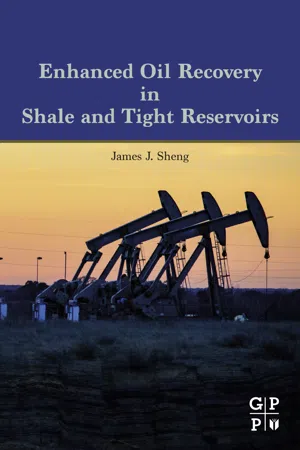
- 538 pages
- English
- ePUB (mobile friendly)
- Available on iOS & Android
Enhanced Oil Recovery in Shale and Tight Reservoirs
About this book
Oil Recovery in Shale and Tight Reservoirs delivers a current, state-of-the-art resource for engineers trying to manage unconventional hydrocarbon resources. Going beyond the traditional EOR methods, this book helps readers solve key challenges on the proper methods, technologies and options available. Engineers and researchers will find a systematic list of methods and applications, including gas and water injection, methods to improve liquid recovery, as well as spontaneous and forced imbibition. Rounding out with additional methods, such as air foam drive and energized fluids, this book gives engineers the knowledge they need to tackle the most complex oil and gas assets.- Helps readers understand the methods and mechanisms for enhanced oil recovery technology, specifically for shale and tight oil reservoirs- Includes available EOR methods, along with recent practical case studies that cover topics like fracturing fluid flow back- Teaches additional methods, such as soaking after fracturing, thermal recovery and microbial EOR
Frequently asked questions
- Essential is ideal for learners and professionals who enjoy exploring a wide range of subjects. Access the Essential Library with 800,000+ trusted titles and best-sellers across business, personal growth, and the humanities. Includes unlimited reading time and Standard Read Aloud voice.
- Complete: Perfect for advanced learners and researchers needing full, unrestricted access. Unlock 1.4M+ books across hundreds of subjects, including academic and specialized titles. The Complete Plan also includes advanced features like Premium Read Aloud and Research Assistant.
Please note we cannot support devices running on iOS 13 and Android 7 or earlier. Learn more about using the app.
Information
Table of contents
- Cover image
- Title page
- Table of Contents
- Copyright
- Acknowledgments
- Chapter One. Introduction to shale and tight reservoirs
- Chapter Two. Huff-n-puff gas injection in oil reservoirs
- Chapter Three. Asphaltene precipitation and deposition in a huff-n-puff process
- Chapter Four. Huff-n-puff injection in shale gas condensate reservoirs
- Chapter Five. Optimization of huff-n-puff gas injection in shale and tight oil reservoirs
- Chapter Six. Gas flooding compared with huff-n-puff gas injection
- Chapter Seven. Water injection
- Chapter Eight. Fluid-rock interactions
- Chapter Nine. EOR mechanisms of wettability alteration and its comparison with IFT
- Chapter Ten. Spontaneous imbibition
- Chapter Eleven. Forced imbibition
- Chapter Twelve. Fracturing fluid flow back
- Chapter Thirteen. Air injection
- Chapter Fourteen. Other enhanced oil recovery methods
- Nomenclature
- References
- Index